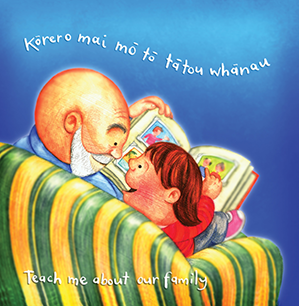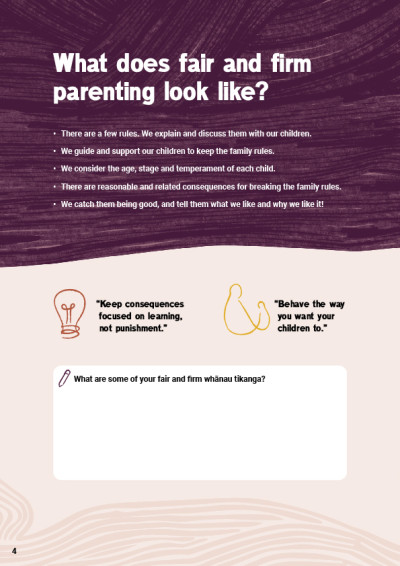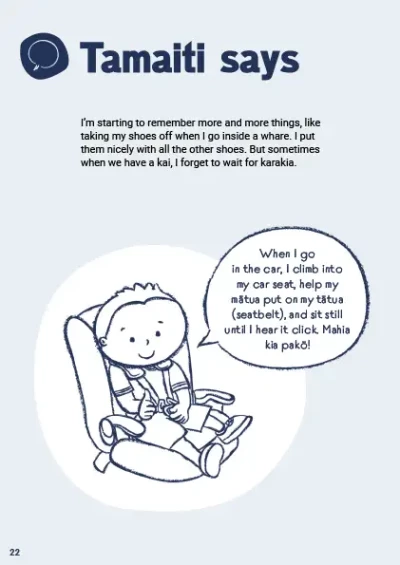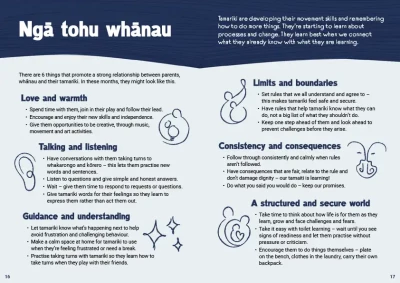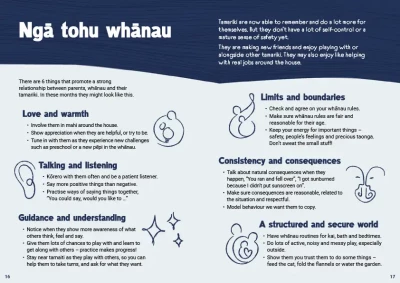
Understanding simple rules
Whānau may want to introduce some simple rules. This allows whānau to set boundaries for their child, and there are effective ways of doing this.
Parents might be thinking about introducing some simple family rules. Between 2 and 3 years of age, children are developing memory and a sense of past, present and future. They’re also increasing their ability to learn to wait and to cope with change. All of these skills will help them when learning about limits and boundaries.
Limits
The most appropriate rules for this stage in a child’s development will be limits that help to keep them safe. Understanding what is realistic can be a real help for everyone.
Ask the whānau:
- What words do you use in your house to describe the limits and boundaries you have?
- Do you have whānau rules, tikanga or a code?
- If you do have rules, what are they?
- How do you decide what is important?
- Are there any particular rules you’d like to introduce to the household and your child?
- Do you think everyone in the household would agree with these rules?
- Yes? No? Why do you think that is?
Firm and fair parenting
The heading on page 4 in the resource 'Thinking about Parenting' is ‘What does fair and firm parenting look like?’
- How would you answer that?
With the parents, look through the list of ideas on page 4 of Thinking about Parenting.
- What do you think of this parenting style?
- Would you like to talk about any other rules that you’re thinking about putting in place?
- How could the things in the list help you?
- Simple explanations work best for children during this stage.
Modelling behaviour
Ask the whānau what they think about the statement ‘Behave in the same way you want your children to’.
Page 6 of the booklet 'Thinking about Parenting' has some more ideas for communicating with children, with examples of how parents might talk with their child.
- How might these tips help you?
Understanding the rules
The Whakatipu booklets Te Kōhuri 2 and 3 may also help conversations with whānau. Page 22 of Te Kōhuri 2 mentions a few rules – taking shoes off to go inside a whare , karakia before kai and putting the car seat belt on.
The basic ideas about rules for this stage are:
- giving simple explanations for them
- acknowledging kids for keeping a whānau rule – ‘catch them being good’
- having a small number of rules (3 to 5), which all the adults support the child to keep – they work well when adults follow them too!
On pages 16 and 17 of both the Whakatipu booklets Te Kōhuri 2 and 3, there is a list of ngā tohu whānau, or 6 things, that promote the best relationships between parents, whānau and their kids. Under the limits and boundaries headings, there are some suggestions for introducing rules with young children. (The following is a selection from both booklets.)
- Set rules that we all understand and agree to.
- Ask them for their ideas about what is fair.
- Kōrero with them and agree on the whānau rules.
What do you think of these ideas?
Try an activity
Sand
Sand play can be a pleasurable solitary activity that a child happily gets involved in. It helps if you set up a few rules – and they know what they are.
 pdf 11 MB
pdf 11 MB
